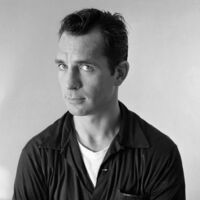
Jack Kerouac
Born in Lowell, Massachusetts on March 12, 1922, Jack Kerouac was baptised Jean Louis Kirouac, the youngest of three children of French-Canadian immigrants from Quebec, Canada. He was raised speaking the French-Canadian working class dialect Joual until he learned English at age five.
Born in Lowell, Massachusetts on March 12, 1922, Jack Kerouac was baptised Jean Louis Kirouac, the youngest of three children of French-Canadian immigrants from Quebec, Canada. He was raised speaking the French-Canadian working class dialect Joual until he learned English at age five.
Kerouac studied at local Catholic public schools and the Horace Mann School in New York City, as well as Columbia University and The New School. He was awarded athletic scholarships to attend Boston College, Notre Dame and Columbia, though an injury during his freshman season at Columbia kept him from playing and eventually led to his dropping out of school.
In 1942, Kerouac joined the United States Merchant Marine, and a year later joined the United States Navy—he served only eight days of active duty before being honorably discharged on psychiatric grounds. Soon after, Kerouac was involved as an accessory in the murder of David Kammerer, having helped his friend Lucien Carr dispose of evidence, and was arrested as a material witness. Unable to convince his father to pay for bail, Kerouac agreed to marry fellow writer Edie Parker, who supported him financially, and moved to Detroit, Michigan. Their marriage was quickly annulled due to infidelity, and Kerouac returned to New York in 1944.
Upon Kerouac's return to New York, he lived with his parents in Queens, where he wrote his first novel, The Town and the City (1950). Through Lucien Carr, Kerouac had met many of the literary figures now associated with the Beat Generation, including Allen Ginsberg and William S. Burroughs, and in 1949 began his most famous literary work, On the Road, which was tentatively titled "The Beat Generation" and "Gone on the Road". Kerouac finished the largely autobiographical novel in April 1951, though it remained unpublished until 1957. During that time, Kerouac completed ten other autobiographical novels, including The Subterraneans, Doctor Sax, Tristessa, and Desolation Angels.
In July of 1957, Kerouac moved to Orlando, Florida, while awaiting the release of On the Road (Viking Press) later that year. Soon after, the New York Times ran a review lauding Kerouac as the voice of a new generation. The success of the novel garnered Kerouac celebrity status as a major American author, and his friendship with Ginsberg, Burroughs, and Gregory Corso cemented the influence of what became known as the Beat Generation. Other poet friends of Kerouac include Philip Lamantia, Gary Snyder, Philip Whalen, Lawrence Ferlinghetti, Michael McClure, Bob Kaufman, Diane di Prima, Lew Welch, and Amiri Baraka.
Though best known for his novels, Kerouac is also associated with poetry of the Beat movement, including spoken word. Kerouac wrote that he wanted “to be considered as a jazz poet blowing a long blues in an afternoon jazz session on Sunday.” And in his “Statement on Poetics” for The New American Poetry, he asserts:
In his introduction to Kerouac's Book of Blues, the poet Robert Creeley writes, “A complaint commonly lodged against Kerouac is that he was at best a self-taught ‘natural’, at worst an example of the cul de sac the autodidact in the arts invariably comes to, a solipsistic ‘world’ of his own limitations and confusions.” He goes on to state that Kerouac's poems themselves “provide an intensely vivid witness of both writer and time.”
Jack Kerouac died from a chronic liver disease on October 21, 1969 at St. Anthony's Hospital in St. Petersburg, Florida, the result of a lifetime of heavy drinking.

